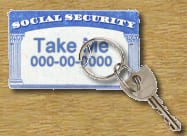 Your social security card has been lost or stolen – what do you do? That’s a tough question. If there is no evidence that someone is actually using the number, neither Social Security nor the FTC will help you.
Your social security card has been lost or stolen – what do you do? That’s a tough question. If there is no evidence that someone is actually using the number, neither Social Security nor the FTC will help you.
If you do have evidence that someone is using your number, you can contact the FTC at 1-877-IDTHEFT or FTC.Gov. If you are unsuccessful in trying to correct the situation, Social Security might give you a new social security number. You can contact them by calling 1-800-772-1213. For more information, visit SocialSecurity.Gov.
You should also report the loss to each of the three major credit reporting agencies: Experian, EquiFax and TransUnion. Ask them to put an alert on your credit report. This will send a signal to any merchants or credit companies that the person requesting a new account may be using stolen information. Actively monitor your credit by ordering free reports from AnnualCreditReport.com
If you are in a state that allows you to put a credit freeze on your credit report, I would do this as well. That way, no one can access your report unless you authorize them to do so. There is a charge: First a fee to freeze your report, then another fee to unfreeze your report when you apply for credit cards, loans, or insurance. But, it’s better to be safe than sorry.
With that thought in mind, remember to keep your card in a safe place and not in your wallet.








